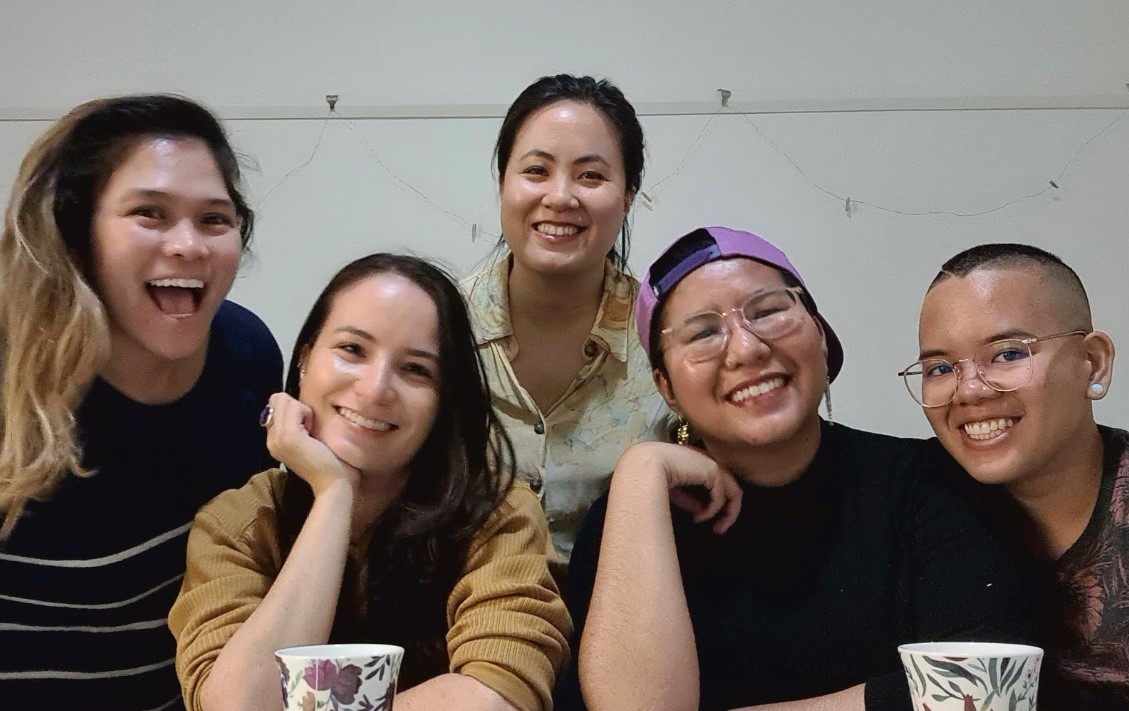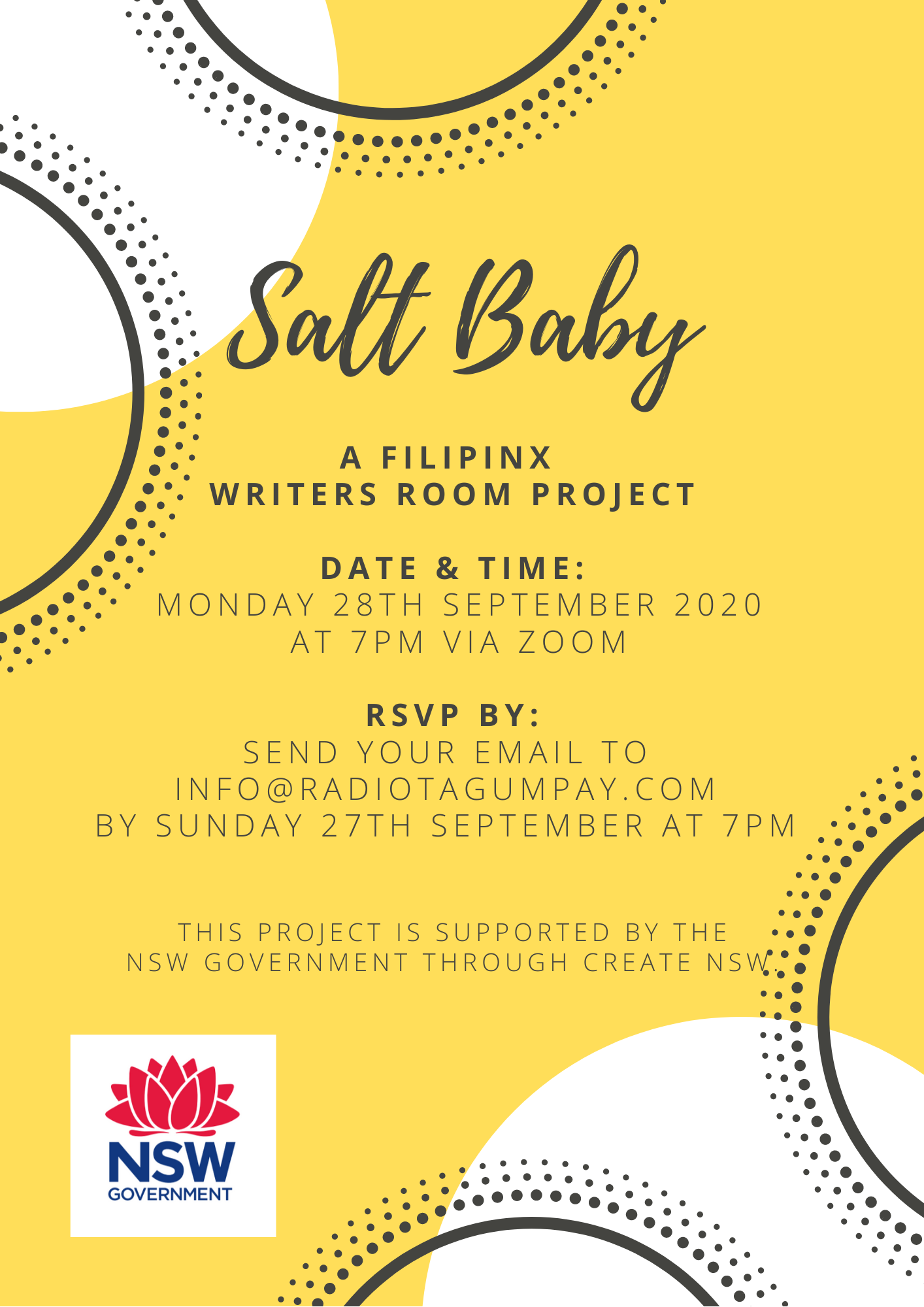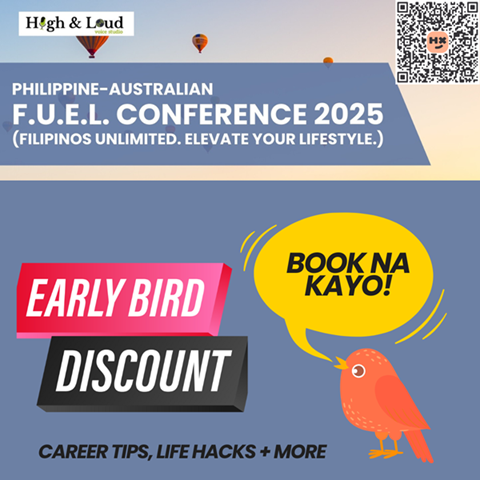
In photo: The artists of The Filipinx Writers Room physically together before the pandemic (left to right) Rizcel Gagawanan, Annie Brockenhuus-Schack, Jules Orcullo, Miranda Aguilar, and Gloria Demillo.
The Filipinx Writers Room is a new sensation in the theatre world in Sydney. It consists of five female and non-binary creatives of Filipino heritage who got together to develop stories inspired from their experiences: Annie Brockenhuus-Schack, Rizcel Gagawanan, Miranda Aguilar, Gloria Demillo, and Jules Orcullo. They will be presenting their first work-in-progress containing excerpts of a play currently being written, Salt Baby.

The Australian Filipina is glad to share the Q&A below to get an insight into two of the drivers of this initiative - Rizcel Gagawanan and Annie Brockenhuus-Shack.
*Tell us about yourself
RG: I immigrated from the Philippines when I was one and grew up in Brisbane. I worked as an accountant before I moved to Sydney to pursue acting. My name comes from my father who’s name is Rizalito. He’s named after our Philippine national hero José Rizal because he was born on José Rizal Day.
AB: I was born in Australia, my dad’s Danish and mum’s from Atimonan, Quezon and migrated to Australia in 1984. I’ve always been drawn to the arts in any capacity. So I did my Bachelor in Media and Arts Management and am now finishing off my Masters in Curating and Cultural Leadership. My name has 26 letters and 2 hyphens, so in a way I’m a double barrel alphabet.
*What achievements do you hold fondly in your heart ?
AB+RG: Bringing Filipinx artists together to create The Filipinx Writers Room. Being able to create a supportive space to collaborate freely and safely but also build skills and relationships. To find kapwa with each other has been an unexpected and rewarding experience. They say in order to survive in this industry you have to “find your tribe” but I think I’ve realised that it’s more than that. Our connection with our community is what keeps you going in every facet in life.
*what challenges have you faced and overcome?

RG: A challenge that I faced and overcame was moving to a new city where I didn’t know anyone when I first moved. Now I’m blessed to say I have a community of friends who have been a valuable support network for me. A challenge that I continuously face is dealing with limited opportunities as an actor of colour and especially the stereotypical roles the Australian media portrays of Filipina women. We are more than maids, nurses, and beauty pageant queens. I know the industry is moving towards diversity and inclusion but at the moment diversity is tokenistic and we have a long way to go when it comes to inclusive practices, especially behind the scenes and in key decision making roles. Our work in The Filipinx Writers Room is just a small contribution we can make to see the change we want to see in the industry. We want to show the multiplicity of experiences of the Filipinx-Australian community and be in charge of telling our own stories. That is what makes good storytelling.
AB: Personally, it’s been in balancing my health and recognising how I may need to structure my days a little differently. Being mixed race, I’ve questioned myself on being Filipino enough, it’s still something that comes up, but my internal critic isn’t as loud. I’ve been quite fortunate to have connected with members from the community and it’s the conversations from that, that have felt quite healing.
*When did you realise that your passion lies in acting/performing arts? when or what was your first public performance?
RG: I got my first taste of performing arts when my mum enrolled me in the Johnny Young Talent School when I was about 4 or 5 years old. I was one of the Playing Cards who were the guards and servants of The Queen of Hearts in Alice in Wonderland. But my passion started in musical theatre. When I was in highschool I participated in all the musical productions. I also competed in Speech & Drama Eisteddfods around Brisbane. In my first competition I was awarded second in the monologue category. I was really surprised that I even placed but that experience gave me validation in my ability which at that time was important to me as a young person. But as soon as I graduated highschool I had to set that all aside because as children of immigrant parents pursuing a secure and stable job was a priority and becoming an actor was considered a hobby not a career.
AB: I remember being really young and seeing a family friend perform in a local musical theatre production of Annie and being fascinated by the technicalities of costume changes and the fact that there was an orchestra pit. I realised I liked being on stage during school plays when I was 7 and I was reminded the other day that I did piano performances at shopping centres when I was 11.
*If you can change anything you have done in the past, what would that be?
RG: I think it’s easy to think about all the changes I could have made in the past because now I’m older and wiser. But I wouldn’t have all this knowledge and wisdom had I not gone through certain experiences in my life. I wouldn’t be where I am today and know the people whom I value in my life if I changed what I did in my past. But at the same time I do have regret. I wished I had put more value on my relationships, and spent more time with my family, especially relatives that have gone before me, my grandparents, Lolo Turing, Lola Conching, Lolo Binong and Lola Tonette. I wish that I had gotten to know them more in life. During Covid I started a personal project where I interviewed my Titas to record our family stories. I wished that every time I visited my Lolo and Lola in the Philippines that I asked more about their lives. They would have so many interesting and valuable stories to share that future generations in my family would appreciate. A big thing for me is trying to connect with those who have gone before us, those we have loved and lost.
AB: I think a level of self awareness and effective time management imbued on my past self would be handy, but on the whole, I wouldn't really change anything because of where I am today, who I am becoming, and what drives me and the values that have been instilled in me because of all of what I've gone through.
* What else do you want to achieve in life or in your field/s you are passionate about?
RG: My goals continuously change every time I learn something new or meet new people that change my perspective and perception of the world. When I first came into the Arts industry all I wanted to do was be an actor and now it's more than that. I want to help underrepresented artists in our community to have more power and freedom to do their work. I want to help them to get into executive leadership roles so that they are in key decision making positions to affect actual diversity and inclusiveness as well as other vital changes in the industry. I want sustainable careers not just for myself but for future generations of artists so that they can confidently pursue their dreams without worrying about security and stability.
AB: I love learning and researching, so there’s the possibility of doing my PhD further down the road. I agree with Riz on wanting to help underrepresented artists and build an industry in key creative and leadership roles that is more reflective of the population. I’m interested in better practices regarding collaborative and collective models, and the way the industry needs to change and restructure to allow these practices to become standard. I’m interested in cultivating sustainability in all aspects of the arts, whether that is through our careers and networks, but also in terms of the business and organisational models and their connection with wider communities.
* What advice would you give, especially the young people who may be hesitating to pursue their passion?
RG: Take the time to really get to know yourself. Know who you are, what you’re about, what you stand for, and what you want. These days it’s easy to copy what everyone else is doing and following the trend, but trends change and you could lose sight of yourself if you’re constantly chasing your tail. What you create in your work essentially comes from you. As cliché as it sounds, be yourself. Or in other words learn to be unapologetic for being who you are. Because your uniqueness is your strength. Also learn to trust yourself and your instincts. This comes with experience so don’t beat yourself up if you don’t get it right every time. We are always learning. Lean on others whom you trust for help and advice. And find the joy in what you’re doing. We pursue our passions because it makes us happy. Remind yourself about that joy every time you face a challenge or set back.
AB: I think it’s helpful to really sit with yourself and understand the motivations driving your choices. Having that sense of grounding of who you are and your values become the keystone of doing work with integrity. It can be really easy to get overwhelmed with social media and needing to appear as a brand or monetising your passions too early that you become focused on the external stuff instead. Regardless what stage you’re at, cultivate the practice and discipline around your passion –– just do stuff, do it regularly and have fun with it. If you can find like-minded creatives that can support you and provide honest feedback, that’s also really handy developing your practice.
Whether you’re starting out or further down the road in pursuing your passion, being mindful of industry and getting curious around who the teams are behind the content. I think it’s worthwhile to question their values, the structures they may have in place to implement that and how that shows up in the final cut. Don’t be afraid to voice those questions, because it’s your time and skill you’re contributing. We’re at a pivotal time in the industry where things are starting to shift for creatives of colour, but there’s still work to be done.
*How do you define success?
RG: Success to me is being content with where I am in life because we’re always gonna want more, and want what other people have. Success is making change happen that benefits our community. I want to see true equity so that people don’t have to face barriers and disadvantages if they want to pursue better careers and livelihoods for themselves. I want it to be a world where we can just live instead of survive. As a Filipina, I come from generations of survivors. For example, my parent’s generation grew up in a state of survival in the Philippines and that continued when we immigrated to Australia. But through their sacrifice we have been blessed to prosper here in Australia as settlers in this country. I feel like I’ve already succeeded because I’m living a privileged life compared to my parents and grandparents. Living is already a success, and with the success that previous generations have afforded us we have to pay it forward for future generations.
AB: On a personal note, success is accepting myself and being at peace with that. It’s also having the drive and action to contribute to change through my own actions which can benefit the community. It’s resilience and being more strategic next time. Success is realising the amount of learning and growth that it takes to be you, and getting excited because there’s still more out there!